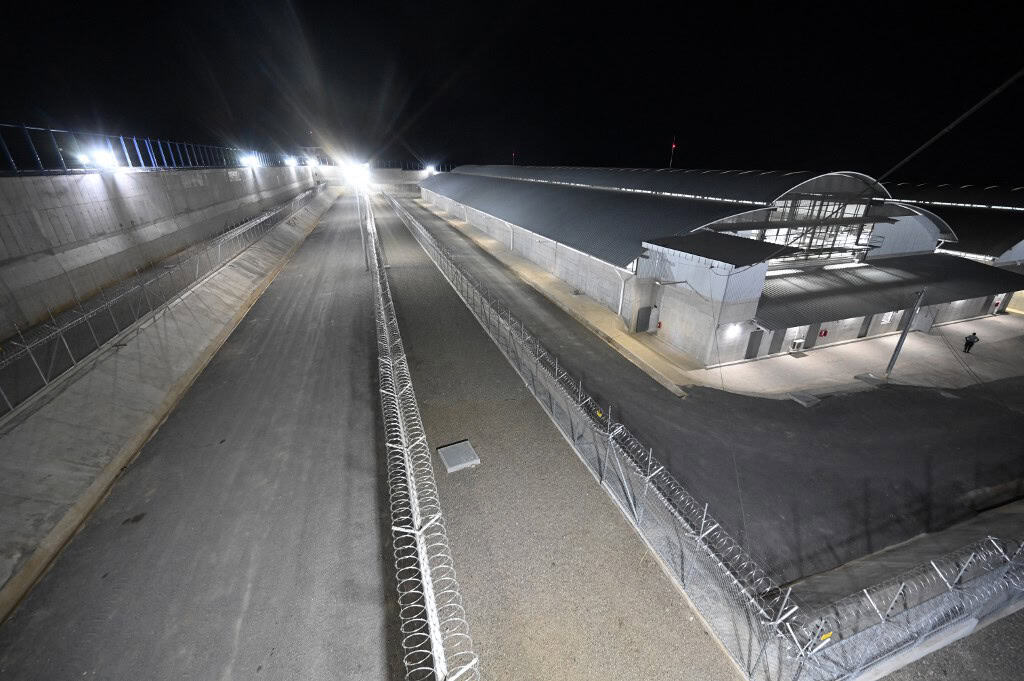Lawyers for the 252 Venezuelan migrants deported by the U.S. government under Donald Trump and held for two months in El Salvador denounced on Friday that their clients are victims of “physical” and “moral” torture. A law firm hired by the Venezuelan government has been unable to visit the migrants in the mega-prison where they are held and is seeking a “proof of life,” but has encountered a wall of silence from Nayib Bukele’s government and El Salvador’s judiciary.
On March 24, the Ortega Group law firm filed a habeas corpus petition with the Supreme Court to end what it calls the Venezuelans’ “illegal detention” since their arrival on March 16, but the court has not yet ruled. “They are being treated like common criminals, and they have had their hair cut off,” said attorney Salvador Ríos. “They have been disguised (…) Those are tortures, physical torture and torture of a moral order,” he said.
Images showing the Venezuelans, hair shaven and chained, being led into the Terrorism Confinement Center (Cecot)—the mega-prison recently built by Bukele—reflect their “grave” situation, Ríos added. Eleven days ago the lawyers also delivered a letter to Bukele—Trump’s key ally in his anti-immigrant policy—requesting permission to visit the Venezuelans and obtain a “proof of life.” The president has not replied.
Fighting Windmills
The defense has made no progress because “the government and the court have remained silent,” Ríos said. “It’s like fighting windmills; it has been an obvious and clear frustration,” he added. Salvadoran Vice President Félix Ulloa recently stated that his government is providing the deported Venezuelan migrants with “what we might call penitentiary lodging.” “It’s like someone coming to El Salvador and asking for medical treatment,” Ulloa told the French outlet Le Grand Continent.
To carry out the deportations, Trump invoked the 1798 Alien Enemies Act—used only in wartime—and accused the Venezuelans of being members of the Tren de Aragua criminal gang, a claim rejected by friends and relatives of the migrants. In a ruling issued this Friday, the U.S. Supreme Court barred Trump from resuming the expulsion of Venezuelans under the 1798 law, finding that the detained group had not been given sufficient time to challenge their removal.
The 252 Venezuelans, along with 36 deported Salvadoran migrants, remain incommunicado at the Terrorism Confinement Center—a mega-prison for thousands of gang members recently built by Bukele. Prolonged incommunicado detention without legal basis “is torture; the damage is not only physical but also moral (…) That kind of torture leaves lasting effects” that “will affect the individual,” Ríos said.
In their letter to Bukele, the lawyers requested a “professional interview” with the prisoners, in person or virtually, to serve “as proof of life for each of the Venezuelan citizens.” They also asked the president to officially publish the “roster or list” of the 252 Venezuelans, which Washington has likewise not disclosed.
Deported by Mistake
The firm filed the habeas corpus petition before the Constitutional Chamber of the Supreme Court on behalf of 30 jailed Venezuelan migrants and “extensively” for the rest. They also requested that the Human Rights Ombudsman verify the conditions of the Venezuelans’ detention and appealed to the Directorate of Penal Centers.
None of these efforts has yielded results. One of the 36 Salvadoran migrants sent back by Washington is Kilmar Armando Ábrego García, deported due to an “administrative error” despite having protections against removal, the U.S. government itself admitted. He was initially held at Cecot but was transferred in April to a penal farm.
A Venezuelan identified in U.S. court documents as “Cristian” was also deported by mistake. In both cases, U.S. judges unsuccessfully asked the Trump administration to facilitate their return to the United States.
Helplessness
The U.N. High Commissioner for Human Rights said this week that the case raises “serious concerns regarding a broad range of rights that are fundamental both in the United States and under international law.” “The families we’ve spoken to expressed a sense of helplessness over what happened and their pain at seeing their loved ones labeled and treated as violent criminals—or even terrorists—without any court ruling on the validity of the accusations,” the commissioner said.
Attorney Isael Guerrero, also of Ortega Group, said that this is “a completely illegal detention,” since the Venezuelans are not being prosecuted “in any court” in El Salvador. “All of them are migrants, and not a single one is being prosecuted” in the United States as alleged members of the Tren de Aragua, added the firm’s head, Jaime Ortega.
In April, Bukele offered Venezuelan President Nicolás Maduro to swap the 252 migrants for Venezuelan “political prisoners,” but Caracas called the proposal “cynical.”







